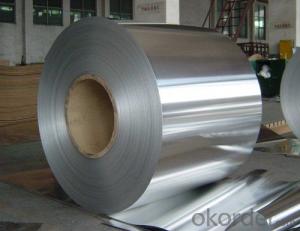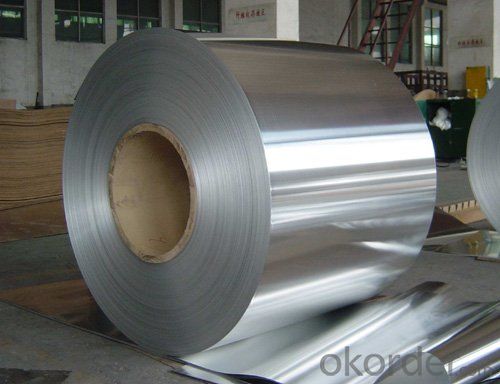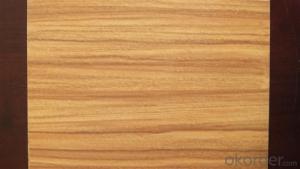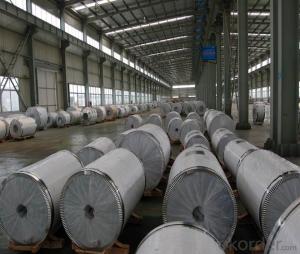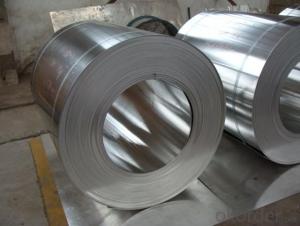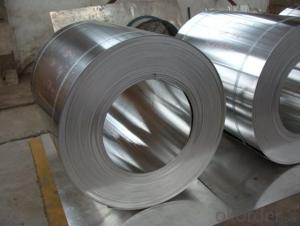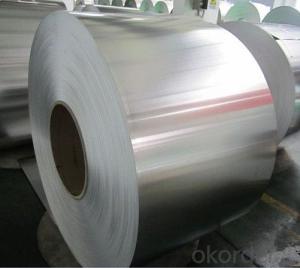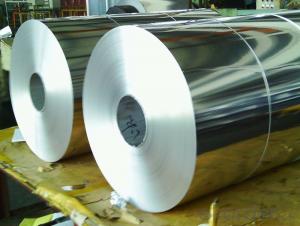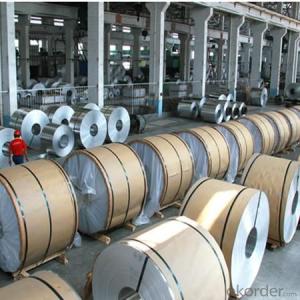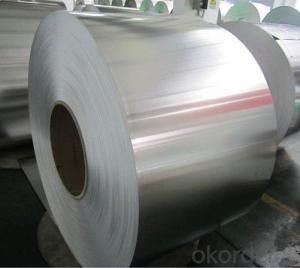Matte Black Aluminum Coil - 5052 Temper H14 H24 0.4mm 0.5mm 0.6mm Thickness Aluminum Roll
- Loading Port:
- Shanghai
- Payment Terms:
- TT OR LC
- Min Order Qty:
- 5 m.t.
- Supply Capability:
- 6000 m.t./month
OKorder Service Pledge
OKorder Financial Service
You Might Also Like
Specification
5052 Temper H14 H24 0.4mm 0.5mm 0.6mm Thickness Aluminum Roll
1050 1060 1070 1100 1235representative series aluminum plate is also known as pure aluminum, in the series in 1xxx series belongs to all the alumina quantity of a maximum number of series. Purity can achieve 99.00% above
3xxx series aluminum represents 3003 3004,3005, 3 A21 primarily. And can be called in the 3xxx series aluminum antirust aluminum production process more outstanding. The 3xxx series aluminum plate is by manganese as the main component. Content at 1.0-1.5 between. Is a rust-proof function better series. Conventional application in the air conditioning, the refrigerator, such as car in damp environment.
6xxx series represents 6061 mainly contain magnesium and silicon of two elements, so focused on the 4000 series and the advantages of the 5000 series 6061 is a cold treatment aluminum forging products, apply to fight against corrosion, oxidizing demanding applications.
Description
item | 1050 1060 1100 3003 Aluminum coil | |
Standard | GB/T3190-2008,GB/T3880-2006,ASTM B209,JIS H4000-2006,etc | |
Material | 1060,1050,1100 3003,3103,3004,3005,3105 5052, 5454,5754 | |
Size | Thickness | 0.5mm-3.5mm |
Width | 800-1500mm | |
Weight/Roll | About 1.5MT/3MT | |
Quality control | Mill Test Certificate is supplied with shipment, Third Part Inspection is acceptable. | |
Surface | Bright, polished, hair line, brush, checkered, embossed, etc | |
Trade terms | Price term | ,FOB, CNF, CIF, etc |
Payment Term | TT,L/C | |
MOQ | 2MT | |
20 GP Capacity | About 20-25MT | |
Delivery time | 1.The products will delivery immediately after receiving the payment. 2.According to the order quantity, prompt delivery. | |
Export to | Ireland,Singapore,Indonesia,Ukraine,Spain,Canada,USA,Brazil,Thailand,Korea,Iran,India,Egypt,Kuwait, Oman,Viet Nam, South Africa, Dubai, Russia, etc | |
Package | Stick blue film→plastic film→waterproof paper→1~2 tons on a export standard pallet(corner protection) | |
Application | 1)Further making utensil.2)Solar reflective film3)The appearance of the building4)Interior decorating:ceilings,walls,etc.5)Furniture cabinets6)Elevator decoraction7)Signs,nameplate,bags making.8)Decoration inside and outside the car9)Household appliances:refrigerators,microwave ovens,audio equipment,etc.10)The consumer electronics:mobile phones,digital cameras,MP3,etc. | |
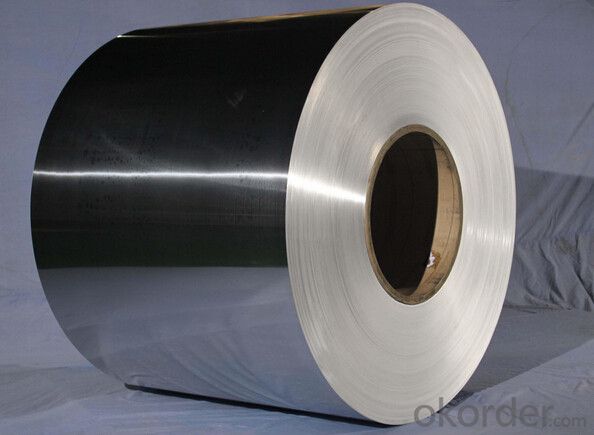
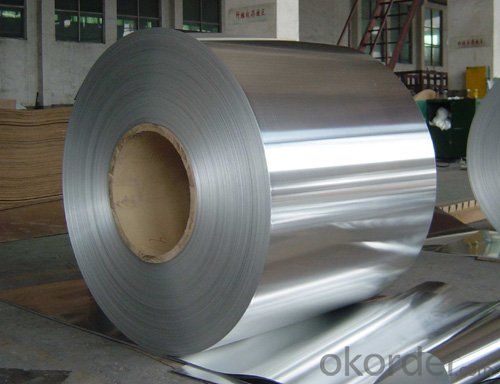
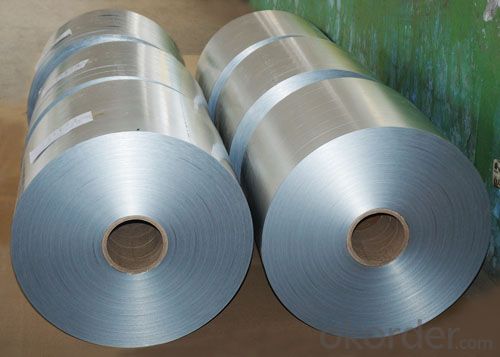
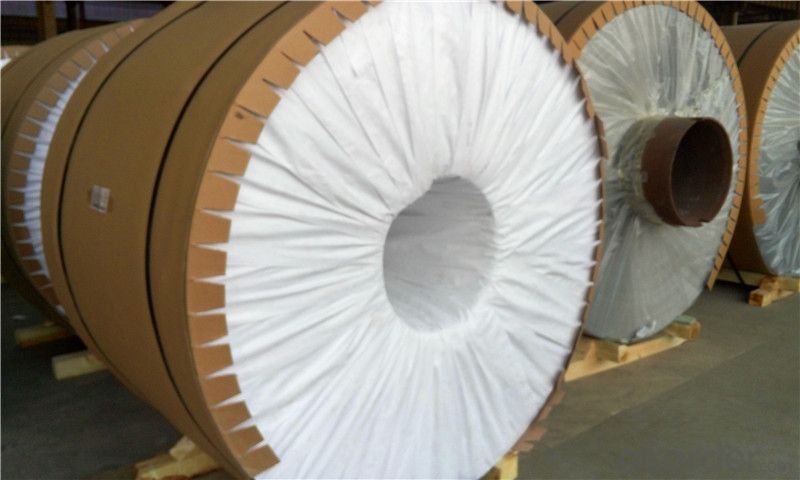
- Q: Are aluminum coils suitable for architectural applications?
- Yes, aluminum coils are commonly used in architectural applications due to their durability, lightweight nature, corrosion resistance, and versatility in design options. They are often used in roofing, siding, facades, and other architectural elements, offering a long-lasting and aesthetically pleasing solution.
- Q: Can aluminum coils be used in the production of aluminum siding?
- Yes, aluminum coils can be used in the production of aluminum siding. Aluminum coils are commonly used in the manufacturing process of aluminum siding due to their durability, lightweight nature, and resistance to corrosion. These coils are usually processed through a coil coating line, where the aluminum is coated with a protective layer to enhance its performance and aesthetics. The coated aluminum coils are then formed and shaped into the desired siding panels, which can be installed on residential or commercial buildings. Aluminum siding is a popular choice for its low maintenance requirements, longevity, and ability to withstand various weather conditions.
- Q: Cost of aluminium coil coating fluorocarbon paint?
- Hello, fluorocarbon paint according to the use of distinction: external wall fluorocarbon paint, aluminum, fluorocarbon paint, metal fluorocarbon paint, steel, fluorocarbon paint. According to industry standards to distinguish: GB products, non GB products.
- Q: How are aluminum coils used in the production of signage and displays?
- Aluminum coils are widely used in the production of signage and displays due to their versatility, durability, and cost-effectiveness. These coils are typically made from high-quality aluminum alloy, which provides excellent strength and resistance to corrosion. In the production process, aluminum coils are first unwound and then passed through a series of rollers to achieve the desired thickness and shape. This process, known as coil coating or pre-painting, allows for the application of various finishes and coatings onto the surface of the aluminum. These coatings can include polyester, polyurethane, fluorocarbon, or acrylic, depending on the specific requirements of the signage or display. Once the aluminum coils are coated, they can be further processed into different forms, such as flat sheets, strips, or even customized shapes based on the design requirements. The versatility of aluminum allows for easy fabrication and customization, making it a popular choice for signage and display manufacturers. Aluminum coils are commonly used in a wide range of signage applications, including billboards, outdoor advertising panels, trade show displays, store signage, and architectural signage. The lightweight nature of aluminum makes it easy to transport and install, reducing production and installation costs. Moreover, aluminum's durability ensures that signage and displays made from aluminum coils can withstand harsh weather conditions, UV radiation, and other environmental factors, making them suitable for both indoor and outdoor applications. The corrosion-resistant properties of aluminum also contribute to the longevity of the signage, ensuring that it maintains its appearance and functionality over time. In addition to its physical properties, aluminum's aesthetic appeal is another reason for its extensive use in signage and displays. The smooth and reflective surface of the metal provides an attractive finish that enhances the visual impact of the signage, helping to grab attention and communicate messages effectively. Overall, aluminum coils play a crucial role in the production of signage and displays by offering versatility, durability, cost-effectiveness, and aesthetic appeal. Their ability to be easily customized, combined with their resistance to corrosion and harsh environmental conditions, makes aluminum an ideal material for creating eye-catching and long-lasting signage and display solutions.
- Q: How are aluminum coils used in the production of industrial machinery?
- Due to their unique properties and benefits, aluminum coils find wide usage in the production of industrial machinery. These coils are typically crafted from high-quality aluminum alloy, which offers outstanding strength, durability, and resistance to corrosion. One notable application of aluminum coils in industrial machinery lies in the manufacturing of heat exchangers. Heat exchangers play a pivotal role in diverse industrial processes, including refrigeration, HVAC systems, and power generation. Aluminum coils prove ideal for heat exchangers owing to their high thermal conductivity, enabling efficient heat transfer. Furthermore, aluminum coils also find utilization in the production of industrial equipment like air compressors, pumps, and turbines. The lightweight nature of aluminum renders it a superb choice for these applications, as it aids in reducing the overall weight of the machinery. Consequently, this leads to enhanced energy efficiency and reduced operational costs. Another significant advantage of aluminum coils lies in their malleability and formability. Aluminum exhibits high ductility, meaning it can be easily shaped and formed into various intricate geometries required for the machinery's components. This facilitates the creation of intricate parts and structures by manufacturers, ensuring precise fit and optimal performance. Moreover, aluminum coils possess exceptional resistance to corrosion, making them suitable for machinery deployed in harsh environments or exposed to corrosive materials. This corrosion resistance contributes to prolonging the machinery's lifespan and diminishing the need for frequent maintenance or part replacement. To summarize, aluminum coils serve as crucial components in the production of industrial machinery. They provide strength, durability, lightweight, and corrosion resistance, making them well-suited for diverse applications such as heat exchangers, air compressors, pumps, and turbines. Additionally, their malleability enables the fabrication of intricate parts, ensuring precise fit and optimal performance.
- Q: How much does it cost to extract aluminium from its raw ore? Also how much does extracted aluminium sell for? I cannot find this anywhere on the internet. I would really appreciate some help.
- These are the points to think about: The high cost of the process because of the huge amounts of electricity it uses. This is so high because to produce 1 mole of aluminium which only weighs 27 g you need 3 moles of electrons. You are having to add a lot of electrons (because of the high charge on the ion) to produce a small mass of aluminium (because of its low relative atomic mass). Energy and material costs in constantly replacing the anodes. Energy and material costs in producing the cryolite, some of which gets lost during the electrolysis. The key cost of the electrolysis and the cost of electricity. This will depend which country you are in, which you don't tell us. If freely available hydroelectric power is available, this makes a huge difference. IF you are in the US, the costs of extracting aluminium or any metal is 70% to 95% of the current market value. Aluminium is selling at about $1500/tonne, then the cost of extracting it can be around $1200/tonne.
- Q: How do aluminum coils contribute to sustainable building practices?
- Aluminum coils contribute to sustainable building practices in several ways. Firstly, aluminum is a highly recyclable material, meaning that the production and use of aluminum coils have a minimal impact on the environment. Recycling aluminum requires only a fraction of the energy needed to produce new aluminum, reducing greenhouse gas emissions and conserving natural resources. Additionally, aluminum coils are lightweight and durable, making them an ideal choice for sustainable building practices. The lightweight nature of aluminum reduces the load on the building structure, leading to lower transportation costs and energy consumption during construction. Its durability ensures that aluminum coils have a long lifespan, reducing the need for frequent replacements and associated waste generation. Furthermore, aluminum is resistant to corrosion and requires minimal maintenance. This quality contributes to the longevity of buildings, reducing the need for repairs and replacements over time. This not only saves resources but also reduces the overall environmental impact of the building. Moreover, aluminum coils offer excellent thermal conductivity, which can contribute to energy efficiency in buildings. When used as part of insulation systems or in HVAC systems, aluminum coils help to regulate temperature and minimize energy consumption. This can result in reduced energy bills and a smaller carbon footprint for the building. Lastly, aluminum coils can be used in various applications, including roofing, cladding, and ventilation systems. Their versatility allows for creative and innovative design solutions, promoting sustainable building practices by incorporating energy-efficient features and promoting natural ventilation. In conclusion, aluminum coils contribute to sustainable building practices through their recyclability, lightweight and durable nature, resistance to corrosion, thermal conductivity, and versatility. By choosing aluminum coils for construction, we can minimize the environmental impact of buildings, conserve resources, and promote energy efficiency, ultimately leading to a more sustainable built environment.
- Q: What are the different coil coating options for aluminum coils?
- There are several different coil coating options available for aluminum coils, each offering unique benefits and characteristics. 1. Polyester: Polyester coil coatings are the most commonly used option for aluminum coils. They provide excellent durability and resistance to weathering, making them suitable for outdoor applications. Polyester coatings also offer good color retention and are available in a wide range of colors and finishes. 2. Polyvinylidene Fluoride (PVDF): PVDF coatings are known for their exceptional performance and durability. They have excellent resistance to UV rays, chemicals, and extreme weather conditions. PVDF coatings also provide outstanding color retention and maintain their appearance for a longer period of time, making them ideal for architectural applications. 3. Polyurethane: Polyurethane coatings offer a high level of resistance to abrasion, chemicals, and corrosion. They provide good adhesion and flexibility, allowing for easy forming and bending of the coated aluminum. Polyurethane coatings are often used in industrial applications where durability and protection are crucial. 4. Silicone-modified Polyester (SMP): SMP coatings combine the benefits of both polyester and silicone coatings. They offer excellent resistance to fading, chalking, and environmental pollutants. SMP coatings provide good flexibility and adhesion, making them suitable for a wide range of applications. 5. Epoxy: Epoxy coatings are known for their excellent adhesion and corrosion resistance. They provide a hard, durable finish that is resistant to chemicals and abrasion. Epoxy coatings are commonly used in industrial settings where harsh conditions are present. 6. Plastisol: Plastisol coatings are typically used in applications that require a textured or decorative finish. They offer good flexibility and impact resistance. Plastisol coatings can be customized with various patterns and textures to enhance the appearance of the coated aluminum. Overall, the choice of coil coating option for aluminum coils depends on the specific requirements of the application, such as the desired level of durability, weather resistance, color retention, and appearance. It is important to consider these factors when selecting the most suitable coating option for your aluminum coils.
- Q: What are the cost implications of using aluminum coils?
- The cost implications of using aluminum coils can vary depending on several factors. Generally, aluminum coils tend to be more expensive initially compared to other materials like copper. However, they offer long-term cost savings due to their durability, corrosion resistance, and energy efficiency. Aluminum coils also require less maintenance and have a longer lifespan, reducing replacement and repair costs. Additionally, aluminum coils are lighter, which can result in lower transportation and installation expenses. Therefore, while the upfront cost may be higher, the overall cost savings and benefits of using aluminum coils make them a cost-effective choice in the long run.
- Q: I go on a trip once a year with a group of lets say 10 people, we go for 7 nights and consume on average approx 120 cans of beer each (throughout the week). We have a fire burning the whole time in a hole that we dig approx 1ft deep, then we dispose of each can in the fire and let them melt down never thinking about them again. That's approx 1,200 cans that melt in the one fire hole.Will the aluminum have an affect on the soil? does anyone know what sort of damage this can cause? and for what distance / area around the fire might be affected?The theory amongst the group is that cans do not hurt anything so that's why they take cans instead of glass.Thanks
- Aluminum is very reactive in air and will form a layer of aluminum oxide around the outside of any piece. This oxide layer is very stable which is why aluminum doesn't corrode. Since your block of aluminum will be totally oxidized being in a fire, it's inert and just going to sit in the hole for the foreseeable future. The burning paint might not be healthy to breath but that's about the only hazard. Most common soil is a mixture of aluminum, carbon and silica compounds anyways so you aren't even adding anything particularly exotic. Alternatively, you could bring along a couple fifths of whiskey. It's lighter and has less packaging so it's the environmentally friendly way to get drunk.
Send your message to us
Matte Black Aluminum Coil - 5052 Temper H14 H24 0.4mm 0.5mm 0.6mm Thickness Aluminum Roll
- Loading Port:
- Shanghai
- Payment Terms:
- TT OR LC
- Min Order Qty:
- 5 m.t.
- Supply Capability:
- 6000 m.t./month
OKorder Service Pledge
OKorder Financial Service
Similar products
Hot products
Hot Searches
Related keywords
